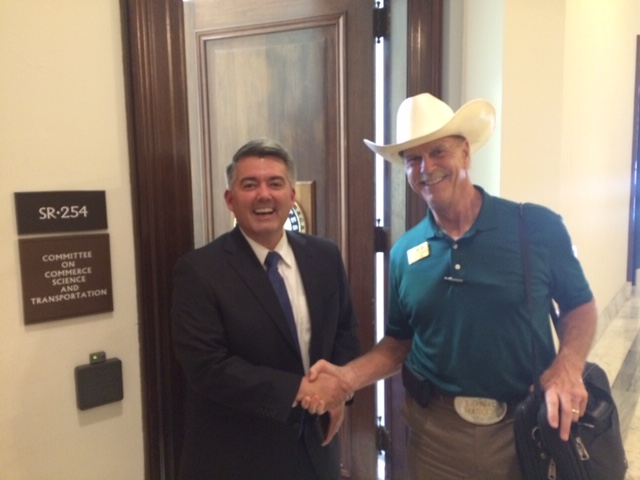COP on the Hill: Stories from the week February 8, 2013
Posted February 14th, 2013 by hiwayhowieCOP on the Hill
Stories from the week February 8, 2013
Jumping in the boat: Below are two emails I received this week. The Member of the second signed onto the repeal bill. These letters are becoming typical of staff reaction to the COP message.
Hi Mr. Wooldridge,
Shelby forwarded your e-mail to me. I’d be happy to speak with you. I’m pretty flexible with my schedule here on the Hill, so you may call my desk at 202-226-xxxx and schedule a time when it’s convenient for you.
I’m already with you 100% on the issue, so to cut to the chase, a 1-to-3 page policy briefing for my boss would be ideal. If you have any proposed legislation in mind, bring a draft with you in writing.
+++++++++++++++++++++++++++++++++++++++++++++++++++++++++++++++++
Howard,
I just wanted to thank you for coming in to meet with me yesterday and explain your position. The information and data that you offered will be helpful in the future as Congress addresses some of these issues. I will make sure that Congressman xxxxx is alerted to the information that you provided in our meeting. Please feel free to contact me in the future with further information.
REPEAL Bill introduced: Congressman Jared Polis (CO-D) introduced HR 499 this week. The wording is substantially the same as last session’s clean and simple Ron Paul/Barney Frank bill to repeal federal prohibition of marijuana. It already has 11 co-sponsors. We ended up with 21 co-sponsors last session. My goal is to double that. Polis talking points are at the bottom.
Rally the troops: I drove an hour to Fairfax, VA on Thursday night to address the Northern Virginia NORML chapter. We had a good crowd and a local reporter made a story and foto of it. I did my best to give them a sense of what progress has been made in Congress and beyond. http://fallschurch.patch.com/articles/local-group-high-on-legalizing-pot#photo-13298093
COP stats since inception: August 2009
- 1078 Presentations to Congressional staffers..11 this week
- 30 Appearances on major TV networks (Fox, ABC, CBS, NBC, Univision)
- 22 published interviews in major (daily)newspapers or magazine this week
- 44 interviews and reports in minor media = blogs, cable TV, weekly papers, etc.. 1 this week
- 71 published letters to the editor (value per MAPINC in free publicity: $70,000) = this week
- 2 editorials in daily papers mentioning my efforts & in support of COP position
- 25 Radio Interviews..1 this week
- 34 brief chats with Members of Congress
- 31 chats with other elected officials, state reps, senators, etc.
- 11 major conferences attended (CPAC, LULAC, NRA, etc)
- Permanent invitation to Grover Norquist’s Wednesday brunch attended by 150 conservative leaders. Named the “Grand Central Station of the Conservative Movement.”
- Consider being a member of COP at $30.00 or more per year. All contributions are tax-deductible. Law Enforcement’s voice in opposition to current policy is vital on the Hill to achieve a repeal of federal prohibition. COP provides that voice. If you agree that Modern Prohibition/War on Drugs is the most destructive, dysfunctional and immoral policy since slavery & Jim Crow and want to be a part of the solution… Go to:
- www.CitizensOpposingProhibition.org and click on Donate/Join – by credit card or send a check to:
- Citizens Opposing Prohibition
- POB 2902
- Washington, DC 20013
Ending Federal Marijuana Prohibition Act of 2013
Rep. Jared Polis (CO-2)
Section-by-Section Summary
Title I: Marijuana Decriminalization
Removes marijuana from Schedule I of the Controlled Substances Act.
Maintains the Controlled Substances Act’s current definition of marijuana.
Prohibits marijuana from being shipped into a state or territory in which marijuana
remains illegal.
Removes special law enforcement authority given to the Department of Agriculture and
the U.S. Forest Service to pursue individuals producing marijuana on federal land. This
bill does not permit growing of marijuana or hemp on federal land. Growing anything on
federal land without a permit is illegal under federal law; this bill simply reduces the
penalty for growing marijuana and hemp so that the penalties for doing so are in line with
those for growing all other plants.
Removes marijuana from the list of “dangerous drugs” for which suspected manufacture
or sale can be considered sufficient for the Department of Justice to issue permission for
a wiretap.
Title II: Regulation of Marijuana Like Alcohol
Adds a “Marijuana” section to the Federal Alcohol Administration Act, ensuring that the
law distinguishes between individuals who grow marijuana for personal use (and are not
subject to any federal registration or permitting requirements) and individuals who are
involved in commercial sale and distribution.
Requires that commercial producers and distributors of marijuana (in states in which
commercial production and distribution is legal) register for a permit with the Department
of the Treasury. Permits will only be available to producers and distributors who have not
committed a crime within the past five years (unless the crime was for a marijuanarelated
activity that was legal under state law at the time).
Requires that Treasury charge a fee for each permit. This fee, which closely emulates the
permit-and-fee system for commercial alcohol manufacturers, will be used to offset fully
the cost of all federal oversight and regulation of marijuana.
Title III: Transfer of Federal Marijuana Jurisdiction
Removes jurisdiction of marijuana regulation from the Drug Enforcement Administration
and gives it to the newly-renamed Bureau of Alcohol, Tobacco, Marijuana, Firearms and
Explosives.
Renames the Alcohol and Tobacco Tax and Trade Bureau the Alcohol, Tobacco, and
Marijuana Tax and Trade Bureau.
Requires the Government Accountability Office to review all parts of the U.S. Code
referring to the Controlled Substances Act or other federal drug laws, and to make
recommendations to Congress of any sections that may need to be amended in light of
this legislation.
Allows a federal agency to continue to set its own drug policy.








No Comments